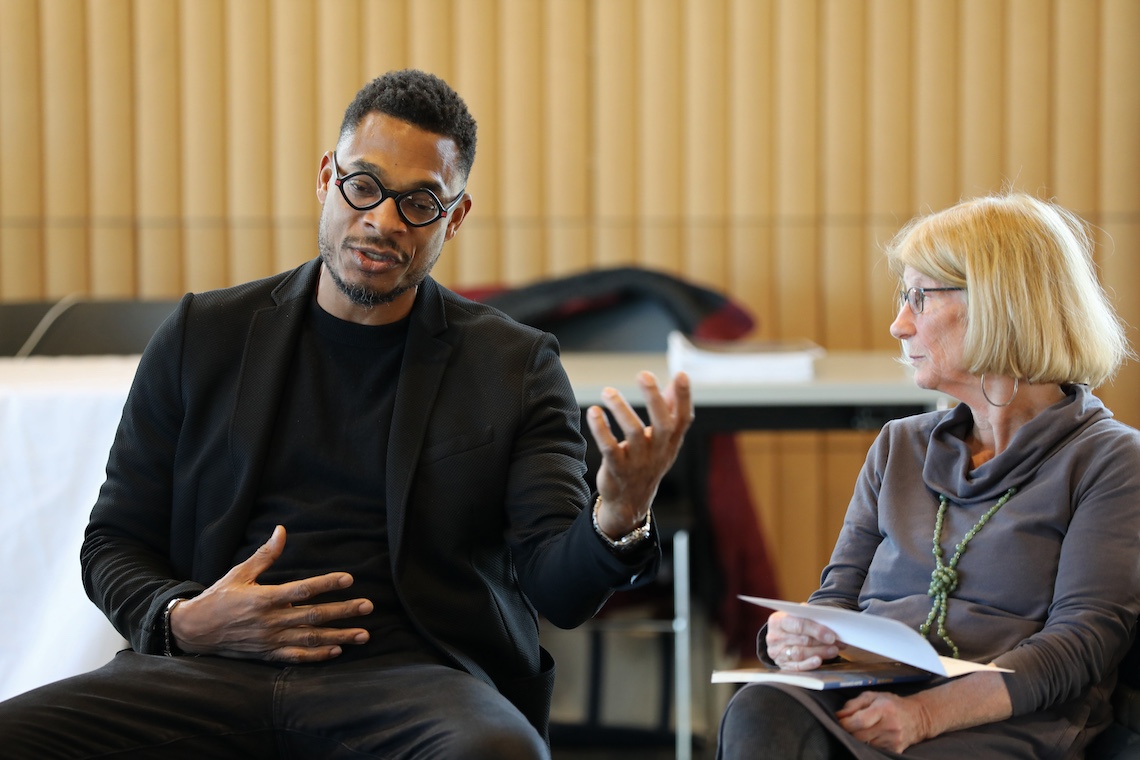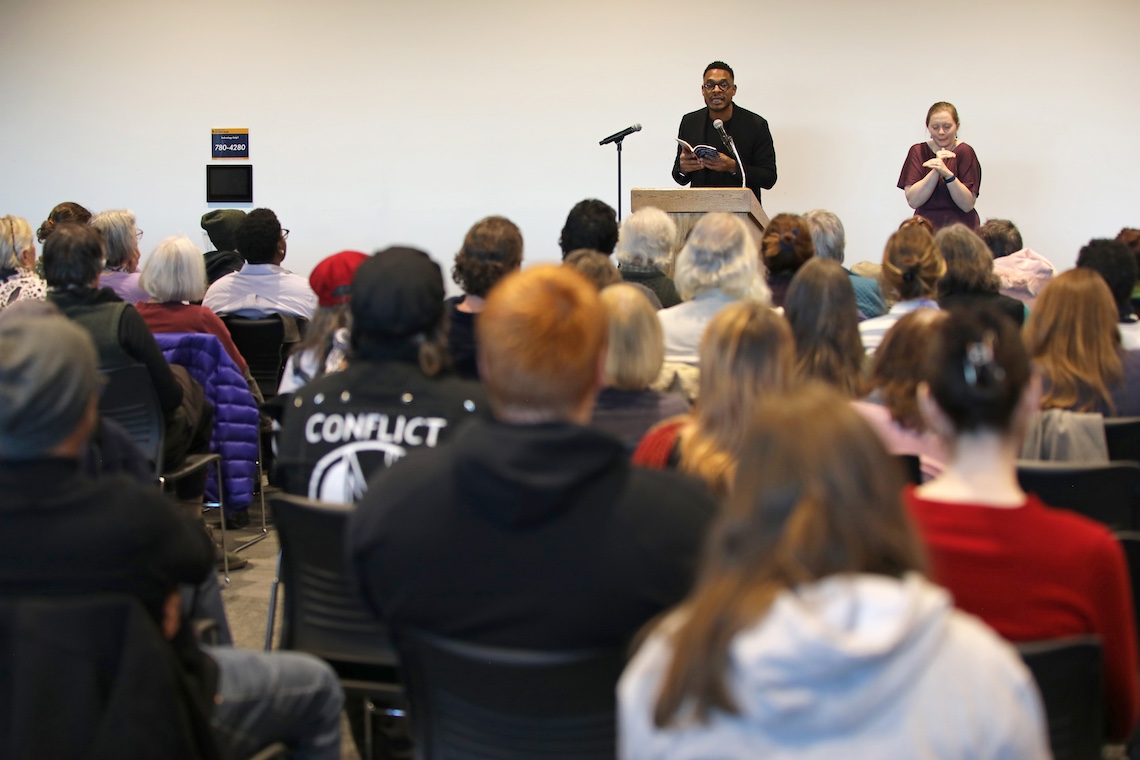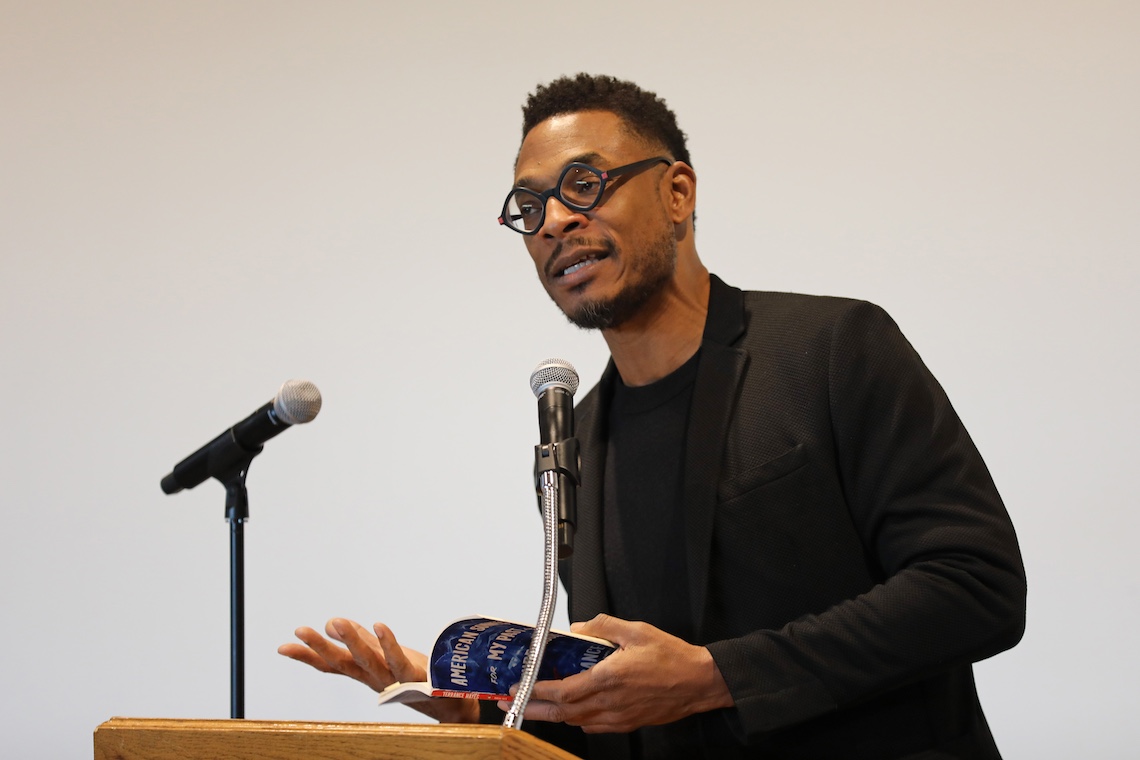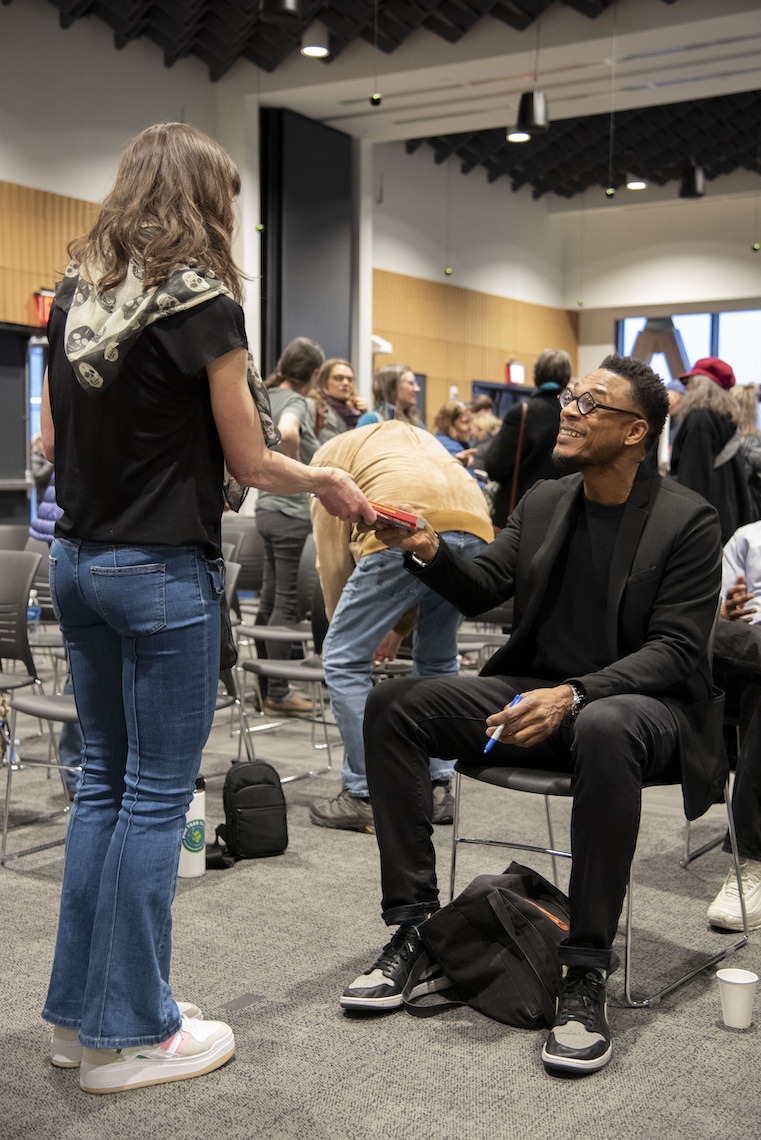
Twenty-five years have passed since the last time Terrance Hayes headlined the O’Brien Poetry Event at the University of Southern Maine. The pent-up excitement to see him again was clear from the size of his audience.
Hayes made his return to the McGoldrick Center in Portland on March 27. A poetry reading is the centerpiece of the annual event, while the preceding roundtable discussion is usually more lightly attended. But for Hayes, the roundtable crowd was three rows deep.
“We’ve been doing those pre-game meetings forever,” said Justin Tussing, an associate professor of English. “I’ve never seen so many people in a room, let alone so raptly paying attention at what was being said. (Hayes) just has that sort of presence.”
The Department of English plans and stages the O’Brien Poetry Event each year. Tussing is also director of the Stonecoast MFA in Creative Writing Program, which co-sponsored the event along with the Office of Student Engagement and Belonging, and the Office of Equity, Inclusion, and Community Impact.
Hayes was a rising star in poetry circles when he gave his first O’Brien reading in 2000. In the years since, he has published multiple poetry collections, including “Lighthead,” which won the 2010 National Book Award. His latest book is “Watch Your Language.” Hayes also teaches English at New York University.

Through all his success, Hayes made occasional trips to Maine and kept in touch with the local literary community. He is particularly close to Betsy Sholl, a former Maine Poet Laureate who taught poetry at USM for 20 years. Hayes calls her a friend and mentor. She reciprocated by moderating Hayes’ roundtable.
The scope of Hayes’ writing offered a wealth of topics for discussion. Hayes doesn’t chain himself to a single format. Sometimes he’ll write a formal sonnet, sometimes he’ll let his words find their own cadence. His subject matter is equally expansive covering everything from national politics to family dynamics to pop music.
“If you buy a record, you’re gonna find stuff to dance to, stuff to fall asleep to, stuff to make love to, and I do think the closest analogy would be music,” Hayes said. “I go at it that way. You try to cover all of the feelings, so they’re all bound to come up.”
Harleigh Boyce wanted to hear more about Hayes’ work habits. She is a junior working toward a double major in English and Theatre. Her writing runs the gamut of poetry, stage plays, and comedy routines. With so much she hopes to accomplish, Boyce can struggle to complete one task before moving on to the next. She asked Hayes how he stays focused.
“I really resonated with what he said which is that you spend more time in practice than at a game,” Boyce recounted. “You need to focus on the practice and focus on the exploration rather than looking toward the final, end result, which makes up just a fraction of your life and time.”

The sports references in Hayes’ answer also frequently turn up in his writing. He played college basketball and athletics remain a touchstone. Along those lines, he characterized the roundtable as a warm-up session to get him into top form ahead of the reading.
During the intermission between the two parts of the program, the crowd continued to grow. All 100 seats were claimed, and about 20 additional guests stood wherever they could find the space. Hayes channeled their energy into his choice of poems.
“I read a few things that I haven’t published because I feel like I can trust the audience,” Hayes said. “Freedom for me is to try the new stuff, and I felt very encouraged by the room.”
The imagery could be intense. In one poem, he described how he forced himself to try a meal that turned his stomach so as not to offend his mother. His impressions at seeing a necklace made of teeth formed the basis of another selection. Hayes also rewarded his fans by reading several well-known favorites like “Continuity,” which contains the couplet:
& he hands her a chalice of fire.
The audience’s mood shifted from awe to amusement when Hayes revealed the movie that inspired “Continuity.” He and his father had been killing time by watching the romantic comedy “How to Lose a Guy in 10 Days,” starring Kate Hudson. Hayes noticed an editing mistake that most viewers would laugh off. Instead, he turned it into poetry.
In “American Sonnet for the New Year,” Hayes mused on the news cycle. The poem revolves around a single sentence that evolves with each iteration. It repeats in a loop without capitalization or punctuation to relieve the growing tension until a final reversal:
increasingly obviously things got ugly suddenly
embarrassingly forcefully things got really ugly
regularly truly quickly things got really incredibly
ugly things will get less ugly inevitably hopefully

Throughout his presentation, Hayes invited questions and observations from the audience, especially students. He reminded them that John Keats was only 25 when he died but is now considered an icon of poetry.
“(Hayes) was championing students,” Tussing said. “He was saying the thoughts you have, the insights you have in your 20s are as valuable as anyone else’s. We’re living in a time when we can use the voices and the ideas and the energy of young people, so I think that’s really exciting.”
Not everyone with something to say wanted to speak publicly, but they still had a chance to talk with Hayes one-on-one at the book signing after the reading. The line wrapped around the room. Some of them asked for a personal inscription. Others expressed to Hayes how much his poetry meant to them. Hayes didn’t leave until everyone had their moment.

